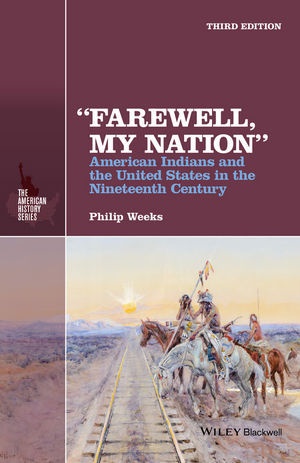Read more
Informationen zum Autor Philip Weeks, Ph.D., is Professor Emeritus of History at Kent State University, where, as a distinguished teaching award recipient, he taught American Indian studies, U.S., Ohio, and modern world history for many years. He is the editor or author of several books, including "They Made Us Many Promises": The American Indian Experience 1524 to the Present (Wiley, 2001) and Buckeye Presidents: Ohioans in the White House (2003). Klappentext "Farewell, My Nation" is an insightful and accessible consideration of the complex and often tragic relationships between American Indians, white Americans, and the U.S. government throughout the nineteenth century, as the government struggled with social and political questions about how to treat America's indigenous population.The third edition of this widely used text has been entirely rewritten in light of new scholarship and in order to incorporate additional primary source materials. Philip Weeks artfully guides readers through the significant changes in Indian-U.S. relations during this pivotal time, outlining the three principal policies undertaken in varying degrees by the U.S. government - Separation, Concentration, and Americanization - and interrogating their respective effectives and repercussions. Offering detailed descriptions, chronology, and analysis of the Plains Wars supported by supplementary maps and illustrations, the new edition of this bestselling text will continue to be a valuable supplement to U.S. History survey courses and essential reading for anyone interested in better understanding the political roots of the relationship between the U.S. government and America's first peoples. Zusammenfassung The fully updated third edition of Farewell, My Nation considers the complex and often tragic relationships between American Indians, white Americans, and the U.S. Inhaltsverzeichnis Preface ixAcknowledgments xi1 The "Indian Question" 1In Need of a Solution 1Breaching the Ohio Country Barrier 7The Shooting Star and the Prophet 182 The Initial Solution 35The Relocation Debate 35Tribal Strategies in the South 40The Cherokee-Georgia Conundrum 46Removing the Southern Tribes 52The Indian Territory and Its People 65Undermining Forces 74Dashed Hopes 813 The Travails of Mid Century 89Western Troubles and the New Solution 89Making Way for the Railroads 98The Texas Challenge 102Whether or Not to Be a Confederate 108Civil War in the Indian Territory 117Unrest in Minnesota 127Colorado and Sand Creek 1374 The Plains Wars, Phase I: Realizing Concentration 151Those Who Resisted: An Inescapable Fate? 153Indian Policy and Who Controlled It 159Defending the Powder River Country 166Dualism: Peace and Force Policies 176Commotion in Kansas 180Implementing Concentration 187With the Olive Branch and the Sword 1955 The Plains Wars, Phase II: Enforcing Concentration 209Again, Indian Affairs and Who Controls Them 210The Grant Peace Policy 214At the Watershed 221The Red River War 228The Peace That Slipped Away 236The Great Sioux War Commences 246The Great Sioux War Concludes 2596 The Search for a New Order 269Reforms and Jurisdictional Disputes 270Reappraising the Concentration Policy 279The Government's Newest "Solution" 293Ending "Old and Injurious Habits" 301Americanization: White Rationalizations and Tribal Responses 306Dead Dreams 314Bibliographical Essay 326Index 338...

